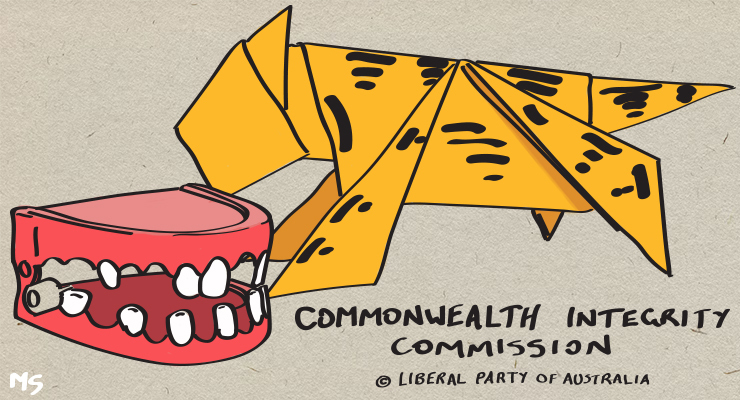
The federal government promised to introduce a federal anti-corruption commission “with teeth” but failed to deliver. It stands as a key broken promise.
It has falsely blamed Labor for stopping one being legislated. During the election campaign, Coalition figures have said it’s not an issue the public cares about, with the prime minister denigrating a powerful NSW-style ICAC as a “kangaroo court”.
Where the others stand
Labor has affirmed that it will establish a “powerful, transparent and independent national anti-corruption commission” by the end of the year if it wins office. It would have “all the independence, resources and powers of a standing royal commission into serious and systemic corruption in the federal government”, according to its policy statement.
The Greens have advocated several measures to clean up federal politics, including a “strong federal integrity commission” where “corrupt politicians” are held accountable.
Independent MP Helen Haines, backed by independent candidate Zali Steggall, has been a strong advocate for a federal anti-corruption commission. She introduced a bill in 2021 which attracted the support of Tasmanian Liberal Bridget Archer.
The independent “teal” candidates — backed by Climate 200 and targeting mainly metropolitan seats — all list integrity in government among their top three issues.
Coalition’s position
At the end of 2018, with an election around the corner, Scott Morrison pledged that his government would introduce a Commonwealth integrity commission (CIC). It was to be a “serious” commission “with teeth, resources and proper processes”.
It would “protect the integrity of Australia’s Commonwealth public administration” while avoiding “the pitfalls, weaknesses and abuses of systems introduced by state jurisdictions and being proposed in alternative models”.
Morrison has been fudging the issue ever since. Last week he dodged a question about where the Liberal Party stood on the CIC, saying his concern was “jobs, jobs, jobs”.
In late 2020, following criticism that the government had moved slowly on its promise, then attorney-general Christian Porter tabled an exposure draft of the government’s CIC bill.
The AG’s office received more than 300 submissions on the bill. An analysis by the Centre for Public Integrity — an independent organisation including judicial figures with direct experience of corruption bodies — concluded the bill required “substantial amendment” if the government wanted to make it “truly fit for purpose.”
The centre determined there were six key flaws in the draft bill:
- The proposed splitting of the commission into two divisions (one dealing with law enforcement agencies; the other with the public sector)
- The narrow definition of corrupt conduct in respect of public sector corruption
- The limited ability of the commission to undertake own motion investigations, and the restricted referral process in respect of public sector corruption (including the preclusion of public and whistleblower complaints being investigated)
- The “reasonable suspicion” threshold in relation to public sector corruption
- The lack of power to hold public hearings in relation to public sector corruption
- The lack of power to report publicly in relation to public sector corruption.
Its analysis of submissions found that only two organisations backed the government’s model. One was national law firm Allens Linklaters; the other was the Institute of Public Affairs, the libertarian lobby group which refuses to reveal its backers.
News Corp through The Australian also campaigned strongly against any commission modelled along the lines of the NSW ICAC.
The Coalition refused to make any meaningful amendments to its draft bill and ultimately failed to pass any legislation.








“In late 2020…, then attorney-general Christian Porter tabled an exposure draft of the government’s CIC bill.”
“The Coalition refused to make any meaningful amendments to its draft bill and ultimately failed to pass any legislation.”
FOR THE SIMPLE REASON THAT IT DID NOT ATTEMPT TO DO SO.
A real ICAC with Real powers would see the Liberal party destroyed .
We can only hope….
I dunno it doesn’t seem to be haunting or bothering them at all really….